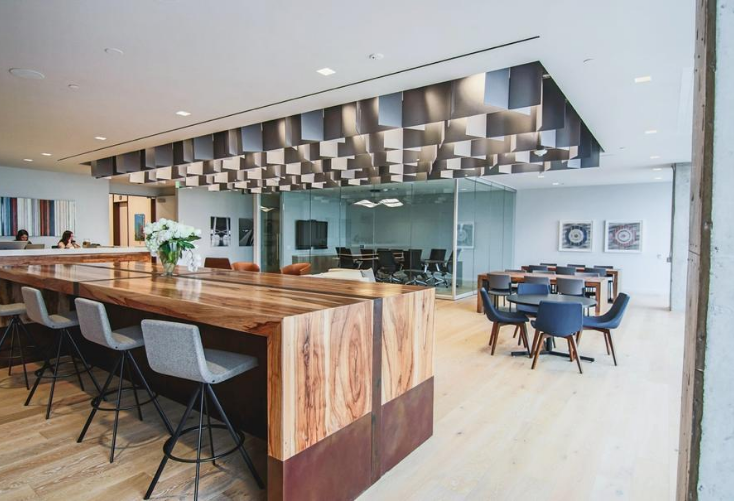Hand selected flexible workspace news from the most reliable sources to keep you ahead of the pack. We find all the latest news, so you don’t have to. Morning and afternoon updates. Stay in the know.
Here’s what you need to know today:
- Major Companies Extend Remote Working Policies NEW
- Landlords Consider Adding Flex Space To Their Buildings NEW
- WeWork Positions Itself As A Safe Office Solution NEW
- How Workplace Culture Is Changing
- The Importance Of Humanizing The Workplace
- Coworking Spaces Won’t Be Going Anywhere
Major Companies Extend Remote Working Policies
Large companies such as Apple, Google, Facebook, Twitter and many others are planning to allow employees to work remotely until at least 2021 as the threat of the pandemic remains.
Tim Cook, CEO of Apple, announced that the company’s employees can work from home until early 2021, while Uber revealed that employees can do so until June 30, 2021.
Facebook also said it would allow employees to work remotely until July 2021 and anticipates that at least half of its workforce will work from home indefinitely.
This follows Google’s recent announcement that it will keep its workers in remote positions until July 2021.
“It’s about being empathetic and having compassion for what employees are going through and how they’re feeling,” said Jay Jamrog, futurist and co-founder of research firm the Institute for Corporate Productivity. “There are a lot of employees who don’t feel safe; they don’t want to go to work and catch the [virus] or bring it home to their families. The wellbeing of employees is huge, and it’s the right thing to do.”
Jamrog also said that employers are also seeing benefits of this new arrangement by cutting down on costs and seeing a bump in overall productivity.

Landlords Consider Adding Flex Space To Their Buildings
Some workers are slowly returning to the office, and with this comes increased responsibility for landlords and business leaders.
The reality of a large second wave is still a major threat, leaving the real estate market anxiously waiting for the unknown. This is particularly true for the office sector, which is at risk as many large corporations reveal plans to implement remotely working policies indefinitely.
This has led some of these large companies to opt for flexible offices for their employees as they move towards a hybrid work environment that allows for both in-office and at-home working.
“About eight weeks ago, companies said to us that once things reopen, people will want to go to work, but no one wants to go to work five days a week,” said Jamie Hodari, CEO of flexible office firm Industrious. “There’s a level of flexibility that companies are anticipating that we’re working to try and provide. But it’s pretty out there. It hasn’t traditionally existed in the real estate market.”
The growth in demand for these workspaces has caused landlords to consider adding their own flex space in their buildings, but this means taking on much more responsibility. Flexible leases deal with more than just maintaining the space — it includes handling food and beverage services, conference room bookings, IT infrastructure, as well as a larger load of contract management, billing and marketing.
Overall, the office is not going anywhere, but it is moving in a much more agile, flexible direction.

WeWork Positions Itself As A Safe Office Solution
WeWork is now marketing itself as a safe flexible office solution for large corporations with more than 500 employees who are seeking alternative workspaces outside of their permanent offices in Australia.
“[COVID-19] has obviously, undoubtedly, had an impact on every company,” said Balder Tol, general manager at WeWork Australia. “And what we see from that is that flexibility actually becomes the most valuable currency as companies throughout the world start to rethink their workplace needs.”
The company originally geared its services towards entrepreneurs, startups and small businesses, but now enterprise clients take up over 50% of WeWork’s core revenue.
Tol added that at the moment, companies are undoubtedly making the shift to a more remote workforce. However, the need for a physical office still remains for many and that is where the opportunity for WeWork comes in.
Moving forward, the coworking firm will be making major changes to their workspaces in order to meet physical distancing requirements and cleanliness protocols. For instance, the company is encouraging the use of virtual social events, training and more.

How Workplace Culture Is Changing
One of the most significant outcomes of the ongoing pandemic is the number of workers that have shifted to remote working arrangements for the first time.
Now, the facade of true professionalism has faded as employees get a more personal look into the lives of their colleagues. The humanization of the workplace is just the tip of the iceberg as we slowly prepare for a post-pandemic world.
A survey from Statistics Canada revealed that over one-quarter of employers would offer remote working opportunities after the dust has settled, and 15% said they would make it mandatory.
Although allowing coworkers to have a peek into our everyday lives can feel vulnerable, research indicates that this could actually improve the connection we have with our colleagues.
In addition to breaking down professional barriers between coworkers, the way we dress has become increasingly casual. While this can open the door for companies to host fun Casual Fridays and Pajama Mondays, some research indicates how we dress can alter the way people perceive us.
Additionally, remote working has modified how employers measure the success of their employees. Rather than focusing on presentation, leaders are able to focus more on the competence and output of workers.

The Importance Of Humanizing The Workplace
Employee engagement has become increasingly difficult to maintain over the past few months as many workers continue to work from home. While this may seem like an insignificant factor in the workplace, having healthy employee engagement can help deter turnover rates, improve morale, boost productivity and even better their overall health.
Research has found that the personal lives are very important to engaged employees, so companies need to recognize and nurture a workplace that focuses on the human touch.
One way to humanize the workplace is to ensure that the process does not hinder collaboration. Systemizing all processes, while sometimes is good for efficiency, can also make employees feel like a cog in the machine. Leaders need to support a collaborative environment that hones in on creativity and teamwork.
Having an agile workforce is also essential to creating a more human workplace. Coming to the realization that business leaders are not always in control and no employee is perfect will be vital to nurturing a healthy work culture. All workers have their own unique strengths and weaknesses, so keeping staff responsibilities flexible will be essential.
Lastly, leaders need to recognize the importance of a person’s personal lives. While it is not necessary to know each and every detail of a worker’s home life, it is important to acknowledge what they find most important: their families, birthdays, anniversaries, hobbies and more. Doing so creates a stronger bond between leaders and their employees, which ultimately leads to better loyalty and engagement.

Coworking Spaces Won’t Be Going Anywhere
Since around March of this year, many companies have come to the realization that they can operate successfully with a remote workforce. This has led businesses to reconsider whether they still have a need for physical office space, but the importance of these workspaces cannot be underestimated.
While offices will have to undergo major changes to accommodate the new needs of workers, real estate professionals will turn to coworking spaces to offer a workspace for those who need one. So what can we expect from the future of the coworking landscape in the coming months?
For starters, the popular open-office plans will no longer be sought after. Instead, operators will look to install cubicles and other similar barriers between work stations in order to keep employees safe. Additionally, meeting rooms and common areas will see a dip in capacity numbers, while reminders that encourage one-way foot traffic and to physically distance will be present.
Shared residential real estate offices are also expected to continue dwindling down. The fact of the matter is that coworking spaces allow individuals or businesses to scale up or down depending on their needs. Even more, coworking members have access to more amenities, as well as desirable addresses.
Overally, flexibility remains essential for workers looking to return to a physical workspace outside of their home. That is why professional coworking spaces will be highly sought after in the coming months.




 Dr. Gleb Tsipursky – The Office Whisperer
Dr. Gleb Tsipursky – The Office Whisperer Nirit Cohen – WorkFutures
Nirit Cohen – WorkFutures Angela Howard – Culture Expert
Angela Howard – Culture Expert Drew Jones – Design & Innovation
Drew Jones – Design & Innovation Jonathan Price – CRE & Flex Expert
Jonathan Price – CRE & Flex Expert












